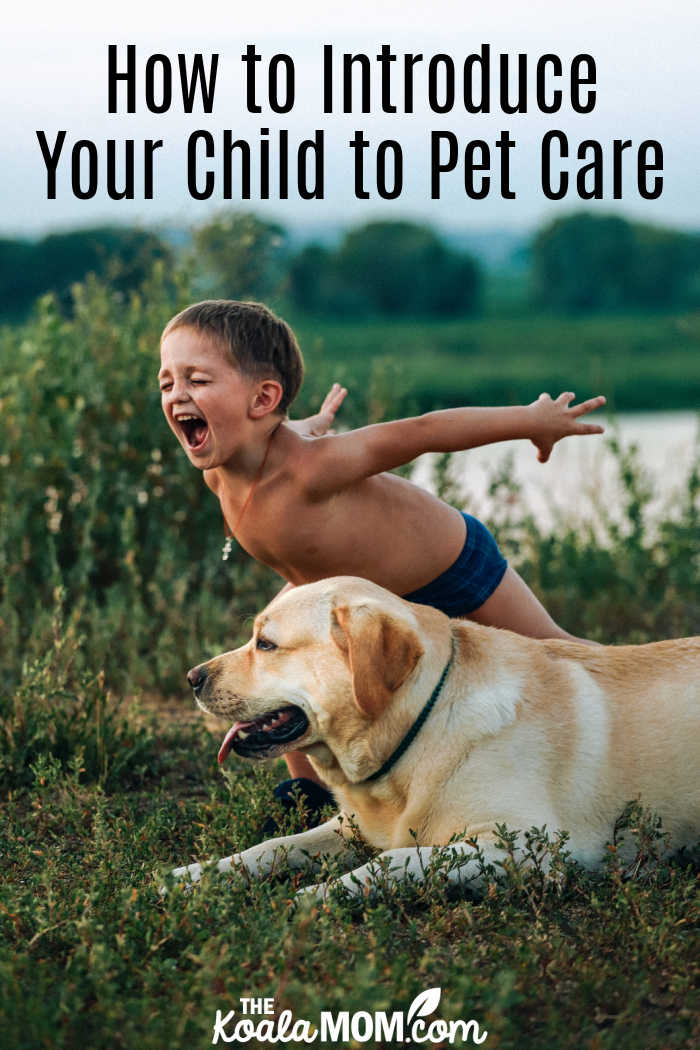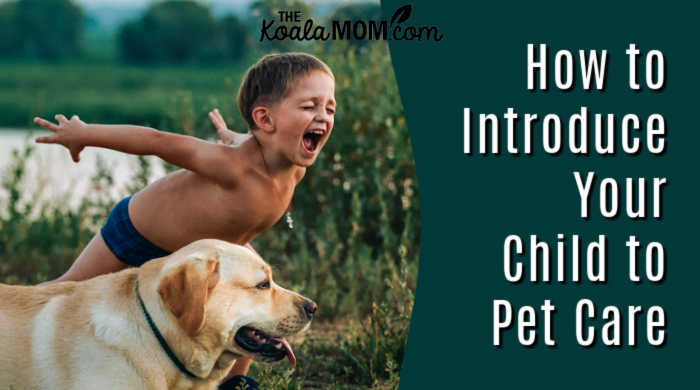Children love pets and pets love children. When a kid sees a cute puppy or kitten, it’s like two rivers that have met and can never be separated again. So, of course, you eventually get your child a pet.
That said, introducing your child to pet care is a great way to teach them responsibility and instill empathy in them. It can also be a fun and rewarding experience for both you and your child. Kids know how to have fun and play but as adorable as pets can be, they are not toys. You (and your child) need to be prepared for the cost and responsibility of owning a pet.

So, with that in mind, here’s how to introduce your child to pet care.
This post contains affiliate links; as an Amazon associate, I earn from qualifying purchases.
Talk to your child about pet ownership
The best approach teaching your child about responsible pet ownership is to start early and be consistent. Explain to them why it’s important to take care of their pet, such as providing food like Mighty Munch, water, shelter and exercise. Show them how to properly handle their pet by demonstrating gentle strokes and speaking in a calm voice.
Make sure they understand that pets need regular love and affection. Finally, explain that all pets require time and attention from their owners – playing with them regularly will help strengthen the bond between your child and their new pet.
My kids talk frequently about their grandparents’ dogs. When we visit their grandparents, the kids get to help take care of the dogs, whether that’s taking Grandma’s dog out for a walk or helping Grandpa get water for his dog. This little snippets of pet care while we were on vacation were a great way to give the kids a taste of what is involved in having a dog.
If you’re thinking about getting a pet, involve your child in the choice. For example, your child could research dog breeds and learn about dog care. Or you can find books from the library on other pets your child may be interested in. A little research ahead of time can help your child start to understand pet ownership and whether this is something they really want to do. (They may decide, for example, that cleaning out the kitty litter isn’t something they’re very keen about!)
Wondering what pet is best for your family? Check out my guide to family-friendly exotic pets for some ideas beyond dogs and cats.
Teach the basics of pet care
Teaching your child the basics of pet care is an important part of responsible pet ownership. Start by teaching them the basics of how to handle a pet, such as not pulling on their fur or tail, and how to approach them in a gentle manner.
Show them how to properly feed their pet, as well as how often they should do so. Also, explain the importance of regular grooming (such as brushing and trimming nails) and bathing for their pet’s health and well-being. Teach your child about the importance of providing exercise for their pet, such as taking them for walks or playing with them in the yard.
When you first get a pet, your child will likely be eager to take care of the pet and won’t need reminders to go feed it. However, as time goes on, your child will start to forget to do chores. It’s help to have a set routine in place to ensure that pet chores happen regularly. For example, I always have one of the kids come feed our cat while I’m making supper (because Jude is usually sitting in the kitchen staring at me, as he knows the routine too).
Your pet will also need regular veterinary check-ups. If taking an animal to the vet is difficult, you may be able to find a vet who’ll come to you; for example, get the best mobile vet Phoenix to come by and give your pet a checkup while your child is there. Your pet can get all the care it needs while your child has an opportunity to learn something about pet care directly from the vet.
Being able to handle illnesses and injuries is another important part of pet care that children should understand. For example, if a performance dog knee brace is needed for an injured pet, your child could know how to assist in their recovery. Teaching them to recognize signs of discomfort or unusual behavior in their pet helps build responsibility and empathy. Encouraging gentle care and regular check-ups ensures that pets stay healthy and well cared for in the long run.
The benefits of introducing your child to pet care at an early age
As mentioned before, introducing your child to pet care at an early age can be a great way to teach them responsibility and empathy. Taking care of a pet requires dedication, patience and understanding – all qualities that are important for children to learn.
It also helps them develop their motor skills as they learn how to groom and feed their pet. Moreover, having a pet around can help children become more social and outgoing. In addition, having a pet can provide emotional support for children who may be feeling lonely or anxious. Pets offer unconditional love and companionship which can be very beneficial for young minds.

Introducing your child to pet care is essential if you want your kids to be around animals. Learning that animals have feelings and that they need love and compassion is an invaluable lesson to teach your child early on.

No Responses Yet